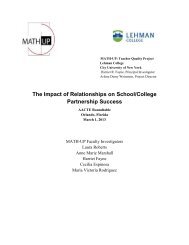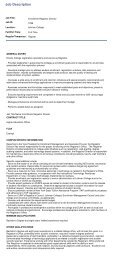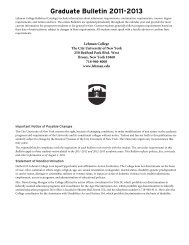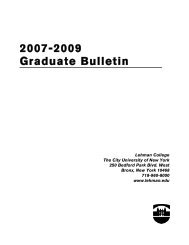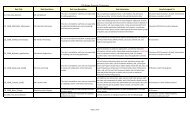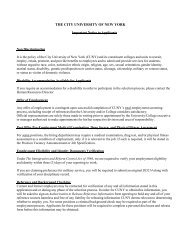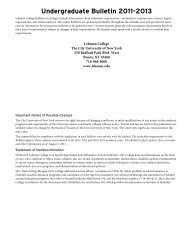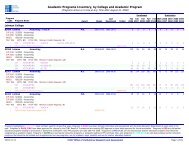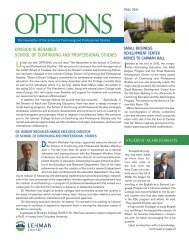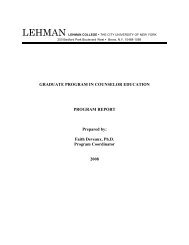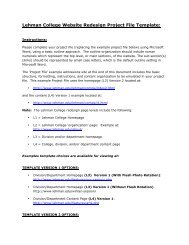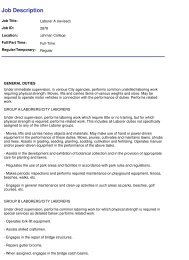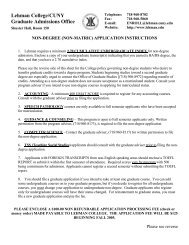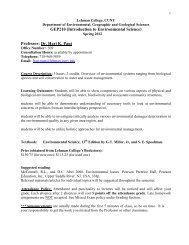LL Spring05.indd - Lehman College
LL Spring05.indd - Lehman College
LL Spring05.indd - Lehman College
You also want an ePaper? Increase the reach of your titles
YUMPU automatically turns print PDFs into web optimized ePapers that Google loves.
• • • • • • • • • • • • • • • • CAMPUS • • • • • • • NEWS • • • • • • • • • • • • • • • • • • •<br />
2<br />
<strong>Lehman</strong>'s Golden Key<br />
Wins Chapter Award<br />
Ayanna Timothy, Haydee Acevedo<br />
accept the Chapter Award from<br />
Professor Di Yerbury, vice chancellor<br />
of Macquarie University in Australia.<br />
The <strong>Lehman</strong> chapter of Golden Key<br />
International Honor Society has<br />
won the prestigious Key Chapter<br />
Award, awarded to only one chapter<br />
each year.<br />
The award honors chapters that<br />
excel in communication, publicity,<br />
meeting management, chapter<br />
activities and leadership, as well<br />
as in participation in regional and<br />
international programs.<br />
Golden Key cited the <strong>Lehman</strong><br />
chapter's “outstanding teamwork,<br />
dedication and collaboration with<br />
other student organizations on their<br />
campus.” Golden Key has nearly 350<br />
chapters on four continents.<br />
<strong>Lehman</strong> <strong>College</strong> of The City University of New<br />
York is located at 250 Bedford Park Boulevard<br />
West, Bronx, NY 10468. Anne Johnson, Vice<br />
President for Institutional Advancement; Barbara<br />
Smith, Director of Alumni Relations.<br />
<strong>Lehman</strong> Lightning is produced in the Office of<br />
Media Relations and Publications.<br />
Editor: Marge Rice. Staff: Keisha-Gaye Anderson,<br />
Barbara Cardillo, Lisandra Merentis, Yeara Milton,<br />
Florian Penev and Phyllis Yip<br />
Pulitzer Prize-Winning Alumnus Mitch Weiss '81<br />
Credits <strong>Lehman</strong> Faculty for Giving Him a Strong Start<br />
Mitch Weiss was never that<br />
excited about school. He<br />
preferred hanging out with friends<br />
and checking out the hottest grafitti<br />
in the New York City subways.<br />
But when he enrolled in <strong>Lehman</strong><br />
<strong>College</strong>, the Pulitzer Prize-winning<br />
journalist found the faculty support<br />
and academic foundation that he<br />
needed to speed him on his way to a<br />
successful journalistic career.<br />
“I wasn’t a great student in high<br />
school,” says Weiss, a writer for<br />
the Toledo Blade. “I was more into<br />
hanging out than I was into going to school.”<br />
Weiss won a Pulitzer Prize in 2004 for his<br />
four-part series, “Buried Secrets, Brutal Truths,”<br />
which exposed a U.S. government cover-up<br />
of Vietnam war crimes committed by the U.S.<br />
military group Tiger Force.<br />
He always knew that he wanted to be a<br />
writer, but it wasn’t until he entered <strong>Lehman</strong><br />
that he began to seriously nurture that dream.<br />
“<strong>Lehman</strong> gave me a great foundation,” he says.<br />
“The thing that really benefited me was the fact<br />
that the teachers were accessible and the classes<br />
were small. It was a world-class faculty.”<br />
After graduating from <strong>Lehman</strong><br />
in 1981, he went on to earn his<br />
master’s in journalism from<br />
Northwestern.<br />
Like many <strong>Lehman</strong> students,<br />
Weiss worked while going to<br />
school to help pay his tuition.<br />
He grew up in the Bronx in a<br />
working-class family that believed<br />
education was very important. He<br />
says that the one-on-one attention<br />
he received from his <strong>Lehman</strong><br />
Mitch Weiss '81 professors really helped him to stay<br />
on track with his educational goals.<br />
“If I didn’t have teachers who were interested<br />
in me, maybe I would have fallen through the<br />
cracks,” says Weiss, whose brother and sister<br />
also graduated from <strong>Lehman</strong>. He tries to give<br />
that same kind of personalized attention to the<br />
students he teaches at the University of Toledo.<br />
“It seemed that the teachers at <strong>Lehman</strong><br />
were more interested in connecting with the<br />
students. That was really helpful.”<br />
Weiss is taking time off to work on a book<br />
based on his Pulitzer Prize-winning article. The<br />
book, Tiger Force (Little, Brown and Company),<br />
is scheduled for release later this year. ◆<br />
The City and the Humanities Program at <strong>Lehman</strong> will sponsor a lecture by Mitch Weiss<br />
and his co-author, Michael Sala, on Thursday, December 1, 2005 at 12:30 pm. All alumni<br />
and friends of the <strong>College</strong> are invited. Details will be posted on the <strong>Lehman</strong> website<br />
(www.lehman.edu) and published in the next issue of <strong>Lehman</strong> Lightning.<br />
Legos ® Aren't Just for Kids Anymore<br />
<strong>Lehman</strong> students are building programming<br />
skills by building robots.<br />
These robots are only about as smart as<br />
a microwave oven, but <strong>Lehman</strong> Scholars<br />
and Honors <strong>College</strong> students are able to<br />
make them do some interesting things.<br />
The students are looking at the effects<br />
of computers on society, especially<br />
how robotics impacts our interaction<br />
with the world. Besides traditional<br />
coursework, the students design, build<br />
and program Lego® Mindstorm Robots<br />
to perform various tasks and also create<br />
a technical guide to their use.<br />
Equipped with only an H8 Hitachi processor,<br />
the same type used in microwave ovens,<br />
the students program the robots to follow a<br />
flashlight, navigate an obstacle course, play<br />
catch with another robot, throw balls into<br />
baskets and send messages to other robots.<br />
“Compared to a regular laptop, the robots<br />
aren’t very smart,” says Professor Katherine<br />
St. John, who teaches the course. “It’s amazing<br />
Professor Katherine St. John (right) watches as Judy<br />
Figueroa runs her robot through its paces.<br />
how much you can do with so little processing<br />
power and speed.” The course also teaches students<br />
about geometry, gearing and locomotion.<br />
“The most practical thing the students learn<br />
is how to program a computer,” says Professor<br />
St. John. “These skills will transfer to programming<br />
in C, C++, and Java—all commonly used<br />
today.” ◆



